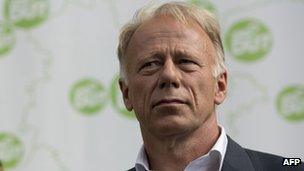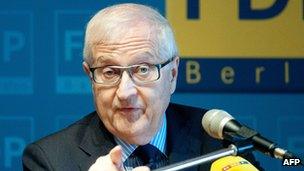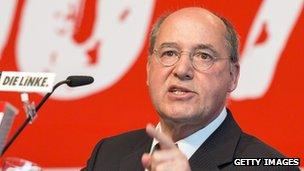German election: Potential coalition 'kingmakers'
- Published
Germany's 22 September election is likely to be dominated by the big centre-right and centre-left parties - the Christian Democrats (CDU) and Social Democrats (SPD). There is much speculation that they might form a "grand coalition". But three other parties are also significant players in Germany's coalition politics. Here, we profile their leaders.
The Greens are election allies of the SPD, and have made important gains in local elections. The liberal Free Democrats (FDP) have been governing with the CDU and its Bavarian sister party the Christian Social Union (CSU), but the FDP has had election setbacks locally. The left-wing party Die Linke (Left Party) is struggling to make much impact nationally, but could possibly join an SPD-Green coalition.
GREEN PARTY - Juergen Trittin

One of Germany's most important policies - the decision to abandon nuclear power by 2020 - was crafted by Juergen Trittin when he served as environment minister in 1998-2005. He was in a coalition government with the SPD, but Chancellor Angela Merkel's conservative CDU has stuck with the policy.
Mr Trittin, 59, is the leading spokesman for the Greens, though Katrin Goering-Eckardt figures alongside him on the party's campaign website.
His early political career was spent in the Lower Saxony parliament and government.
In the 2009 federal election the Greens got 10.7% and they have made gains in regional elections since then. In 2011 they took control of Baden-Wuerttemberg - in south-west Germany and the country's third-biggest state. That ended 58 years of CDU rule there.
In a big ARD television debate on 2 September with the leaders of the FDP and Die Linke, he ruled out joining a coalition with the CDU. He accused the CDU of neglecting green energy targets, saying, "I want Germany to be a leader in green energy."
The Greens want Germany to rely entirely on renewable energy - mainly solar, wind and hydroelectric power. Mr Trittin says bigger investment in renewables could create 100,000 new jobs in Germany.
In July Mr Trittin got drenched in the Werra river when his canoe capsized, during a Green publicity exercise to keep German rivers clean.
The Greens are close to many SPD positions on social welfare. Mr Trittin, like the SPD, said Germany must introduce a national hourly minimum wage of 8.5 euros (£7; $11).
He also said a Green government would create 30,000 additional creche places - something that would enable many more German women to go out to work.
The Greens would also increase the basic tax-free allowance, to ease the tax burden for most citizens. Mr Trittin accused the CDU of using savings made through economic austerity to pay for tax breaks for the rich.
Mr Trittin is scathing about the European Central Bank's (ECB) low interest rate policy, saying it has aggravated distortions in the EU by turning Germany into a safe haven, sucking money out of the ailing eurozone countries. Greece requires much more foreign investment, in addition to its bailout money, he argues.
FREE DEMOCRATS - Rainer Bruederle

Rainer Bruederle, 68, has been a member of the Bundestag since 1998 and served as economics and technology minister in 2009-2011.
In the TV debate he rejected calls for a national minimum wage, arguing that employers must be free to set wage levels according to conditions in their sector and region.
The FDP is close to business leaders and champions the free market. But opinion polls suggest that the party is struggling - it might not pass the 5% threshold needed to get seats in the Bundestag.
Mr Bruederle has mocked the Greens' call for a weekly "vegetarian day" in workplace cafeterias. The "Veggie Day" suggestion has become a big talking point in the election - the news website Spiegel, for example, asked if it would herald "an eco-dictatorship".
In the TV debate he also criticised Green and SPD plans to tax the wealthy at a higher rate and stressed that the CDU-FDP coalition's policies had led to a big fall in unemployment.
On Greece, he defended the tough austerity conditions attached to the bailout, saying "we believe in solidarity, but in return those countries must solve their structural deficiencies". The fundamental problem for Greece is a lack of competitiveness, he argued.
In mid-June he had a nasty fall one evening, in which he broke an arm and a leg. But he got back into the election campaign fray, despite hospital treatment and a limp.
Mr Bruederle has criticised the way Germany's shift towards renewable energy - the "Energiewende" - is being implemented. The FDP believes energy companies are best placed to decide how to meet targets for fuel efficiency and renewables. Yet there is widespread discontent among Germans about electricity tariffs, which are among the highest in Europe.
DIE LINKE - Gregor Gysi

Gregor Gysi, 65, heads a party which emerged out of the old East German communist party, the Socialist Unity Party of Germany (SED).
He trained as a lawyer and served in the SED for many years. He was in the party's reformist camp during the pro-democracy transition inspired by former Soviet leader Mikhail Gorbachev, which resulted in the fall of the Berlin Wall in 1989 and reunification of Germany.
He has vehemently denied allegations that he used to help the Stasi - the East German secret police.
Opinion polls suggest that Die Linke is heading for 8-10% of the vote. In 2009, it did better, with nearly 12%.
In the ARD debate, he demanded "social justice", complaining that Germany has no minimum wage, whereas 21 other EU countries do. He said more than seven million Germans are in low-paid "mini-jobs" and more than 400,000 full-time workers struggle on low wages and rely on welfare "top-ups".
He also criticised the Greens and SPD for supporting the Greek bailout conditions hammered out by Mrs Merkel's government.
Mr Gysi argued that the key problem facing Greece is tax evasion. He proposed linking tax and citizenship, so that Europeans can no longer dodge taxes by simply moving abroad. He pointed to the US example - Americans living abroad still have to file a US tax return.
Mr Gysi said the tax burden must be eased for Germany's middle class and he would move to curb "social dumping" - the low-wage competition that has become a big issue across the EU.
He ruled out making cuts to vocational training programmes or the health service.
His party also objects to German military deployments overseas - he criticised the SPD for backing the German involvement in Afghanistan. Die Linke also opposes German arms exports.